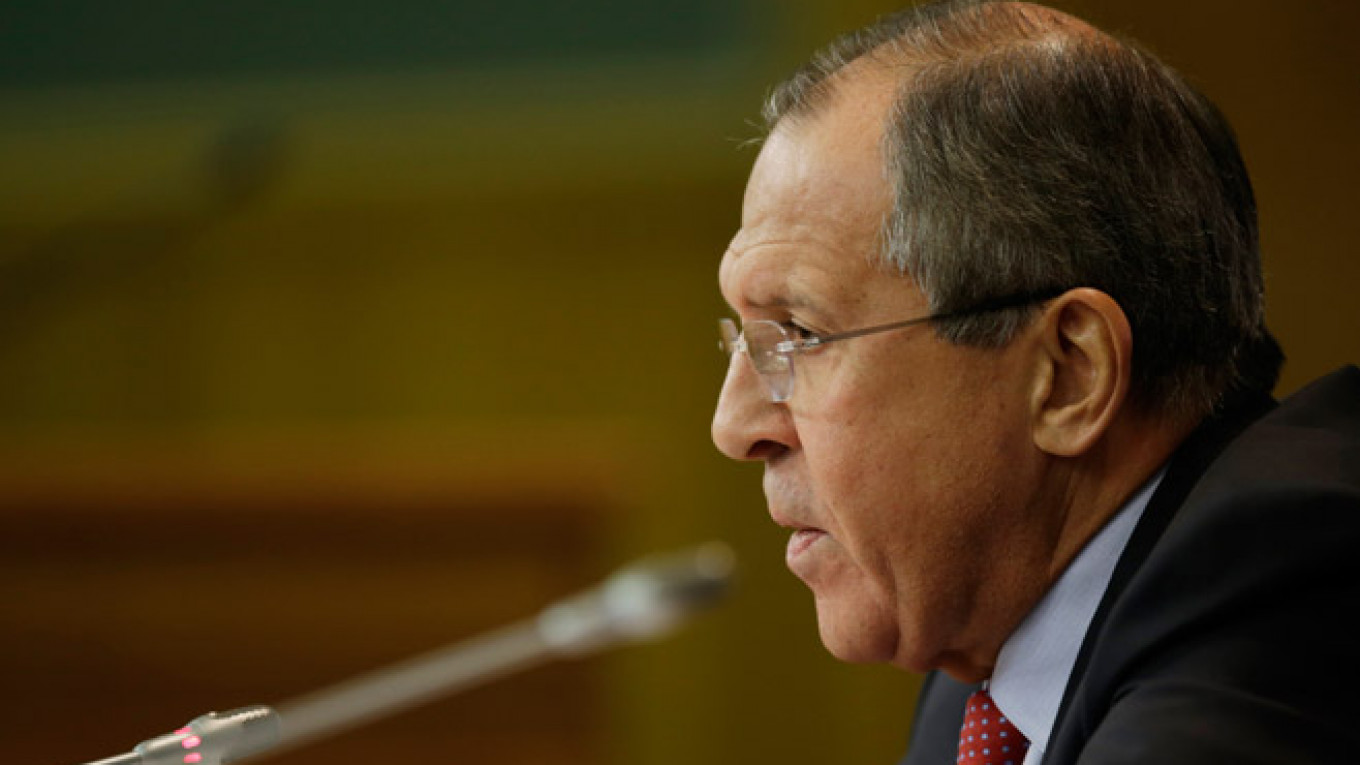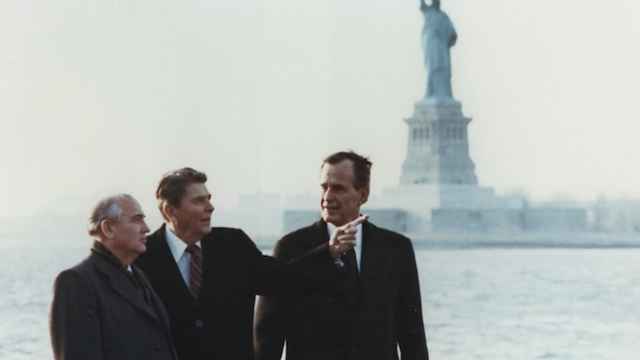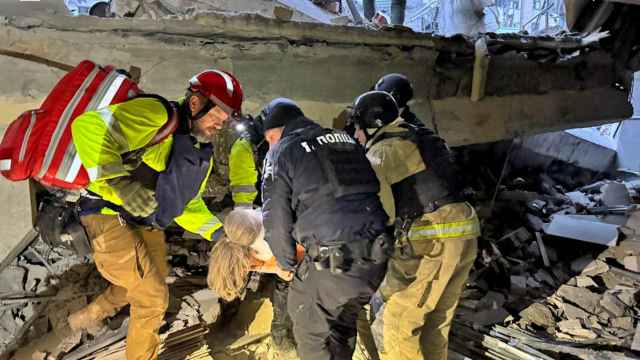The prospect of assuaging the rift in U.S.-Russia relations appeared dimmer Monday after Russian Foreign Minister Sergei Lavrov predicted that the dire state of bilateral ties would persist for a long time.
Lavrov's bleak forecast follows last week's multilateral talks about the situation in Ukraine on the sidelines of the 10th Asia-Europe Meeting Summit in Milan, which the Kremlin said were replete with "misunderstandings and disagreements." Although the talks led to a tentative agreement on Russia supplying Ukraine with gas for the winter, they left much to desire in terms of ending fighting in eastern Ukraine and upholding the tenuous cease-fire.
In Monday's open lecture, delivered as part of the ruling United Russia party's Civil University Project, Lavrov suggested that improvement in Russia's bilateral relations with the U.S. was dependent on a shift in the distribution of global power and had little to do with the resolution of the crisis in Ukraine.
"Americans' general reevaluation of their place in the world, their realization of what has happened in recent decades, the realization that there is no alternative to the growing tendency toward a multipolar world and the strengthening of new centers of economic and financial power and political influence — all these things will take time," Lavrov was cited by Interfax as saying.
More Than Ukraine
"The Ukrainian crisis is just one manifestation of the sour relations between the countries," Viktor Kremenyuk, deputy director of the Institute for U.S. and Canadian Studies at the Russian Academy of Sciences, told The Moscow Times on Monday.
"It is a serious episode, of course. Tensions in relations go back to the war in Yugoslavia, to ongoing fears of NATO expansion. The issues Russia and the U.S. don't agree on would still be there, even if you hypothetically took away the crisis in Ukraine," Kremenyuk said.
A series of unresolved issues blot Russia's relations with the U.S., such as disagreements on the rights of the LGBT community and human rights activists, the moratorium on the adoption of Russian children by U.S. families and the cessation of high-level work on disarmament and international security issues.
Lavrov said Monday he disagreed with the American approach of fighting the Islamic State through a U.S.-led coalition, repeating Russia's argument that any intervention should be sanctioned by the United Nations Security Council.
Sticking Point
Alexei Makarkin, deputy director of the Moscow-based Center for Political Technologies think tank, said the lingering tensions between Russia and the U.S. are bound to stay because of their incompatible interpretations of international law and political legitimacy, which were showcased by the crisis in Ukraine.
"The West considers that Russia violated international law through its annexation of Crimea," Makarkin said. "Russia has no intention of compromising on Crimea. And Russia considers that the West supported an illegitimate coup in Ukraine. In this context, tensions will of course remain."
U.S. Secretary of State John Kerry said after a meeting with Lavrov in Paris last week that the two sides had agreed that "we have to tackle head-on those areas where we have a profound difference and find a way to try to work through those differences constructively."
But Russia's top diplomat has been especially critical of his U.S. counterpart in recent days, blaming the American side for hindering bilateral cooperation.
"I explained to U.S. Secretary of State John Kerry last week that we [Russia] are always open to cooperation," Lavrov was cited as saying by Interfax on Monday. "But we cannot be adopting a selective approach [to cooperation]. We need to communicate honestly, openly and exclusively on equal footing, on the basis of mutual respect for the interests of each country and respect of the partner's intellectual capacities."
No Reset
In late September, Lavrov said the country's relations with Washington needed a "Reset 2.0," a term initially used to designate efforts to mend Russo-American bilateral relations early in U.S. President Barack Obama's first term. But revamping relations is up to the U.S., according to Lavrov, who said in an interview with NTV on Sunday that Russia could not "lose Ukraine" and criticized the United States for tabling proposals that he said only suit its own interests.
"Our initiatives, as a rule, seek to accommodate their [the American] approach and strike a balance of interests," Lavrov told NTV.
Russian authorities have also expressed skepticism about the possibility of mending the country's relations with the U.S. when addressing foreign — and especially American — audiences. In an interview with American television network CNBC last week, Prime Minister Dmitry Medvedev — who led the Russian side's negotiations for an attempted "reset" of relations with the U.S. during his presidency — said a reset was "absolutely impossible" while "stupid" and "destructive" sanctions are in place against Russia.
State media broadcasts have also intensified their U.S.-bashing in support of the Kremlin's narrative. On Sunday, pro-Kremlin talk show host Dmitry Kiselyov, notorious for his anti-Western rants and homophobic comments, devoted a segment of his weekly program to highlighting what he said were similarities between Obama and Islamic State leader Abu Bakr al-Baghdadi. The show featured a graphic listing "disregard for the rights of others," "readiness to kill without trial," "cruelty" and "messianism" as commonalities between Obama and al-Baghdadi.
Contact the author at g.tetraultfarber@imedia.ru
A Message from The Moscow Times:
Dear readers,
We are facing unprecedented challenges. Russia's Prosecutor General's Office has designated The Moscow Times as an "undesirable" organization, criminalizing our work and putting our staff at risk of prosecution. This follows our earlier unjust labeling as a "foreign agent."
These actions are direct attempts to silence independent journalism in Russia. The authorities claim our work "discredits the decisions of the Russian leadership." We see things differently: we strive to provide accurate, unbiased reporting on Russia.
We, the journalists of The Moscow Times, refuse to be silenced. But to continue our work, we need your help.
Your support, no matter how small, makes a world of difference. If you can, please support us monthly starting from just $2. It's quick to set up, and every contribution makes a significant impact.
By supporting The Moscow Times, you're defending open, independent journalism in the face of repression. Thank you for standing with us.
Remind me later.






